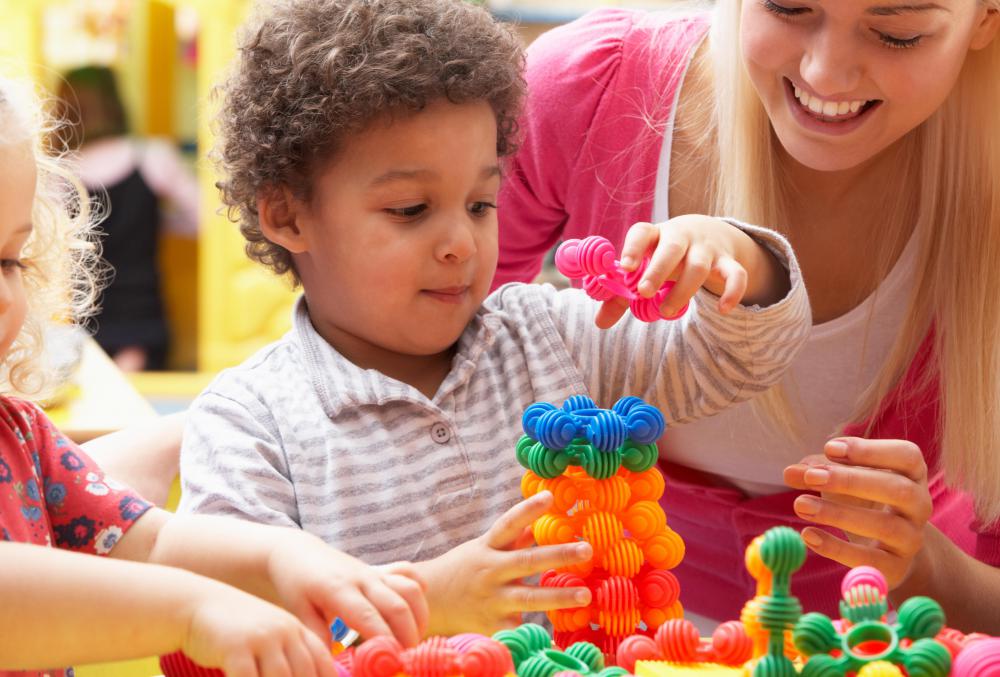At TheHealthBoard, we're committed to delivering accurate, trustworthy information. Our expert-authored content is rigorously fact-checked and sourced from credible authorities. Discover how we uphold the highest standards in providing you with reliable knowledge.
What is the Preoperational Stage?
The preoperational stage is a stage in childhood development under the four stage system proposed by Swiss psychologist Jean Piaget. Piaget divided childhood development into distinct stages marked by major functional changes in thinking and psychology. Understanding these stages is important for evaluating children as they develop, and for understanding how to approach young children in a way which they will find accessible. Psychologists, educators, and people who work with children in a law enforcement capacity are all interested in the stages of development and the ways in which they influence children.
The preoperational stage is the second of the four stages, lasting between the ages of two and six, right around the time a child starts school. It is sometimes subdivided into two smaller stages, the symbolic function and intuitive thought stages. One of the key features of the preoperational stage is that it marks the time that a child starts to acquire language, which marks a major shift in the way a person's brain works.

In the preoperational stage, children are very heavily influenced by their perceptions. For example, they do not understand conservation, a concept described by Piaget. Children who have difficulty with conservation have trouble understanding that the quantity of something can remain the same despite physical transformations. For example, if a child is shown two identical containers filled with the same amount of juice, and the juice is poured into two different containers, the child will think that one holds more liquid, not understanding that the same amount of juice is held in each container.

The preoperational stage is also marked by egocentrism, in which a child is unable to think about something from the perspective of someone else. Children also have trouble with logic and abstract thinking during the preoperational stage, because so much of their knowledge is perception based.
Being in the preoperational stage comes with some major changes in thinking and cognitive development. In addition to acquiring language, children also start to explore fantasy and imagination. With language acquisition comes an understanding of the idea that something can be represented even though it actually present; for example, the word “banana” describes a banana, just as an image of a banana does, even if the banana itself is not around. Children also start to play with ideas like pretending that objects are other things, transforming sticks into wands, sheets into superhero capes, and rocks into pets with the power of the imagination.
AS FEATURED ON:
AS FEATURED ON:














Discussion Comments
@ Dental Floss: The theory doesn't really account for anything considered abnormal. But that's what allowed him to be so precise.
Piaget says that conservation can't be understood by children in the preoperational stage. I completely understand the example about juice. I go through the same thing with my child. I pour the same amount of cereal into her bowl as her brother's. But her bowl is bigger, and all she sees is that it's not full to the rim, like the smaller bowl, and complains that her brother has more cereal than she does.
I explain to her that it's the same amount, and that her bowl is just bigger, but I'm not sure if she really gets it. Maybe when she gets past the preoperational stage, she'll understand.
There are a lot of different theories about the development of children. However, my daughter is four, and she completely fits into the description of the preoperational stage. Her imagination is amazing! She has a never-ending supply of imaginary friends, and even the occasional imaginary house, filled with all of the things she wishes she had, but doesn't. For example, she wants a real dog. Therefore, she says she has one and it is at her (imaginary) pink house.
I find it all very fascinating.
In some kids, the child development stages are not nearly so developed. Children with disorders like autism or down syndrome, for example, might not fit into these categories at all.
While that can be a good indication that they have a disorder, they can still be functional in other ways at the same time.
Post your comments